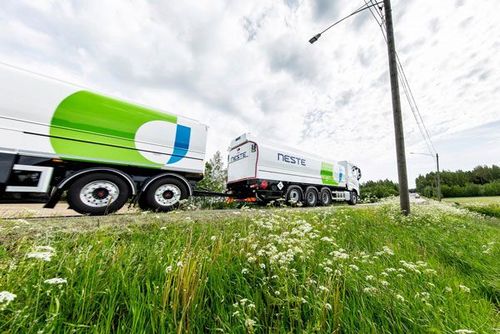Responsible Sourcing Principles for Renewable Fuel Products

June 6, 2024
BY Helene Dieck
Production of renewable fuels and biofuels is increasing to meet growing demand. For instance, in 2023, 60% of California’s fossil diesel was displaced by biomass-based diesel, according to the California Air Resources Board. As the world’s leading producer of renewable diesel for road, marine and offroad applications, as well as sustainable aviation fuel (SAF) and renewable feedstock solutions for various polymers and chemicals industry uses, Neste has set for itself internal corporate targets for three interlinked areas: climate, biodiversity and human rights.
In this article, we outline some specific diligence measures Neste has implemented pertaining to these three target areas.
Assessing Suppliers
Neste uses a variety of globally sourced raw materials to produce its renewable products. The majority of these are waste and residues. In 2023 alone, waste and residues accounted for 92% of our renewable raw material inputs globally. To ensure our products are not contributing to forced labor or deforestation for instance, Neste subjects raw material suppliers to due diligence. This includes reviews to verify that suppliers meet environmental, social, governance (ESG) requirements, including a commitment to adhere to Neste’s Supplier Code of Conduct (or equivalent) and Responsible Sourcing Principle. The reviews encompass a comprehensive range of topics that include governance, labor standards and practices, human rights, the environment, as well as health and safety.
Additionally, we conduct periodic audits to evaluate compliance with Neste’s Supplier Code of Conduct and Responsible Sourcing Principle. Suppliers are expected to remediate significant open issues within a specified timeframe. The audits are conducted either by our own local specialists or a third party.
Advertisement
Advertisement
Importance of Risk Evaluation and Collaboration
Neste sources raw materials from more than 60 countries on five continents. We conduct a raw material and country risk assessment with an industry-leading subject matter expert. The assessment allows Neste to effectively prioritize activities by identifying risks in certain countries or geographical areas.
We maintain an up-to-date country risk categorization based on specified indices, such as ethical business practices, human and labor rights, and health and safety.
In addition to the diligence processes and audits, Neste engages regularly in capacity-building with suppliers, and works closely with industry bodies to effect positive change.
Advertisement
Advertisement
As an example, Neste is an active member of the Consumer Goods Forum, Forest Positive Coalition and Human Rights Coalition. For instance, the Forest Positive Coalition brings together more than 20 global consumer goods manufacturers and retailers to leverage collective action and remove deforestation, forest degradation and conversion from key commodity supply chains. As part of this coalition, members are committed to advancing landscape initiatives.
Another example of collaboration is in advancing regenerative agriculture practices. These practices can help sequester more carbon in the soil and improve soil health, promote biodiversity and reduce emissions from agriculture, while increasing farm productivity. No-tilling and using cover crops are common regenerative practices. With over 60 field trials across the globe, working with farmers, other value chain partners and research institutions, we have been studying a variety of crops and regenerative agriculture management practices for both annuals and perennials to identify the most promising concepts for scale-up.
The production of renewable fuels is a complex process involving diligence and collaboration. Neste utilizes responsible sourcing to mitigate risks like forced labor and deforestation. Through audits and supplier capacity building, Neste promotes sustainable supply chain practices. Active involvement in industry coalitions and regenerative agriculture initiatives highlights Neste’s commitment to global positive change. As demand for renewable energy rises, Neste's measures and partnerships are an important aspect of a sustainable future.
Author: Helene Dieck
Senior Sustainability Manager, Neste
www.neste.com
Upcoming Events





